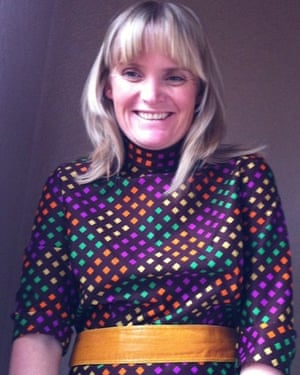What would you do if you were told you were going to lose your eyesight in three months? It happened to Steph Cutler, who was a successful fashion designer working for brands such Ted Baker and Marks & Spencer when, in her late 20s, she was told she would lose most of her vision within three months.
As Cutler’s sight started to deteriorate as a result of the rare condition Leber’s hereditary optic neuropathy, a friend took her on the London Eye for a last look at the cityscape. Cutler also threw an “I’m going blind” party as a way of “getting it out there” and telling all her friends at once. She then travelled for three months, visiting the US, South America and New Zealand, to see the world while she still could.
The lowest point was on her return, when her sight loss got worse and she found herself without a job – fashion design relies so much on the visual it was no longer viable – living back with her parents and struggling even to get a job interview, let alone a new job.
Blasting out U2’s Beautiful Day each morning to get herself out of bed, Cutler set two goals: “In the short term, to become employable again and in the longer term, to get my independence back. Working to achieve those goals has been the hardest thing I have ever done.”

The first step was to learn to use computers, phones and read printed information with assistive technology. Then, using her own experience of feeling unemployable as a result of acquiring a disability, Cutler spotted a gap in the market. There was a need, she felt, for disability and equality training on raising awareness of making recruitment and services open to disabled people.
Few people were doing this at the time, but it was still a difficult business model to build. Although organisations knew they should be doing more, they often didn’t prioritise it or want to pay for it, Cutler said.
And so, with the help of a government business startup scheme and funding, Making Lemonade was born. The name came from a mantra Cutler adopted while adapting to living with sight loss: “If life deals you lemons … get out there and make lemonade.” The yellow and green lemonade branding and theme runs across all marketing material, blogposts and even a recipe to ”make successful lemonade”, a free personal development guide offered on her website.
“The main challenges when I started out were that nobody knew me and I also had a steep learning curve to get up to speed about other disabilities, history and equality law. I did a lot of networking, going along to events and talking and listening to people to find out what they actually needed. This could feel like a thankless task, as there was rarely any instant business, but meeting face to face could result in proposals even three years later,” says Cutler.
She is now a trustee for charity Action for Blind People, a fellow of the Clore Social Leadership programme, represents disabled people on various national committees and has been recognised in high profile business awards including national finalist in Enterprising Young Brit 2006 and Disabled Entrepreneur of the Year in 2008.
Customer feedback led Cutler to train in new areas and add new strands to Making Lemonade, including motivational speaking, coaching and self-employment workshops. “People kept asking me to speak about my story at events but I turned them down as I didn’t ‘do’ public speaking. Eventually I realised there was no basis, apart from fear, for this. So I joined the Professional Speaking Association and worked at improving my skills, then started accepting invitations to speak. For once, being blind was an advantage – it’s a lot easier to stand up and speak to an audience when you can’t see them,” she says.
Having an interesting personal story to tell can provide a big advantage for small businesses, Cutler says. “Many SMEs are about the person behind them and if you’re comfortable telling your story, it can help you to stand out from the crowd and inspire others too. This can be great for all sorts of marketing including social media, your website, blogposts and pieces in the media.”
Now in her eleventh year of trading, Cutler is proud of what she has achieved. “I’ve worked with some amazing clients in the public, private and charity sector and have made a difference along the way,” she says.
Plans for developing her business include providing more coaching for “non-disabled” people and expanding her use of the “design thinking” approach in her consultancy work. This is a creative and hands-on approach to solving problems and developing strategies, adopted by companies such as Apple, Google and Samsung, based on the way that designers work.
Now Cutler has marked 10 years since losing her sight, by writing an ebook of memoirs and thoughts, Living with More Vision and Less Sight. She says the biggest lesson she has learned along the way is that whatever life deals you, it’s your choice how to view those circumstances. She recounts a family game over Sunday lunch which involved created six-word memoirs. Hers is: “Everything changed, all for the better.”
Sign up to become a member of the Guardian Small Business Network here for more advice, insight and best practice direct to your inbox.
Going blind in your 20s: "when life sends lemons, make lemonade"
Hiç yorum yok:
Yorum Gönder